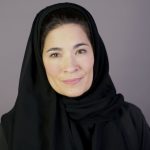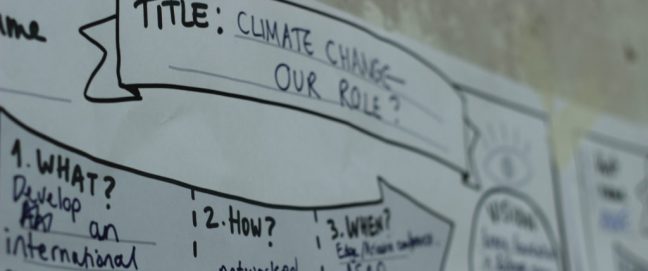 As part of Alliance magazine’s anniversary celebrations this year, celebrating Alliance’s 25 years at the heart of global philanthropy, we have launched a series of events on what the future of philanthropy holds in different regions of the world. This webinar focused on the who, what, where and how of Arab philanthropy, in partnership with Arab Foundations Forum (AFF) and sponsored by the Centre for Strategic Philanthropy, Judge Business School at the University of Cambridge.
As part of Alliance magazine’s anniversary celebrations this year, celebrating Alliance’s 25 years at the heart of global philanthropy, we have launched a series of events on what the future of philanthropy holds in different regions of the world. This webinar focused on the who, what, where and how of Arab philanthropy, in partnership with Arab Foundations Forum (AFF) and sponsored by the Centre for Strategic Philanthropy, Judge Business School at the University of Cambridge.
Co-moderated by Elika Roohi, digital editor of Alliance magazine and Naila Farouky, CEO at AFF, the panellists were Noura Selim, executive director of the Sawiris Foundation for Social Development in Egypt; Moukhtar Kocache, independent consultant and co-founder of Rawa in Palestine; and Rasha Al-Turki, CEO of Alnahda Society in Saudi Arabia.

Naila Farouky, AFF CEO
After Roohi welcomed the audience, Farouky spoke on the importance of the panellists’ experiences on the Arab region’s philanthropic landscape, ‘given the myriad ways in which it manifests across this vast region.’ It would be a mistake to believe that entire regions can be lumped together homogenously, and from AFF’s vantage point ‘with members in at least 11 countries across the region, we definitely know that although we face similar challenges’, such as government and banking restrictions, ‘the ways in which we practise philanthropy do vary from place to place, and for different reasons.’
Reflecting on the past ten years alone, ‘the region has faced many socio-political and economic events that have affected the way our philanthropic sector functions. Then in 2020, the global impact of the Covid-19 pandemic took things to a whole new level. While we may be navigating the consequences of a post-revolution, post-Arab Spring reality, we’re now faced with also designing the future of our sector in a post-Covid reality – making that task much more difficult.’
Farouky acknowledged that the role of foundations and other non-profit sector players cannot be understated and emphasised the importance of collaboration and partnership. ‘In our sector I think we pay a lot of lip service to the benefits of partnership, and the benefits of cooperation, but our societies – many of which depend on the efficacy of the third sector – will not survive without a concerted effort on our part to build partnerships that are based on shared experience, based on transparency of data, shared knowledge. That true spirit of building stronger societies together.’ Building on this, AFF will be looking to grow their reach, expanding the eligibility criteria for members whilst also launching a data project on the response by Arab philanthropic actors to Covid which spans the entire region.

Noura Selim, Sawiris Foundation Executive Director
Selim was the first of the panellists to speak, reflecting on four key points that have happened over the trajectory of philanthropy in Egypt over the last decade.
- The institutionalisation of philanthropy. ‘The Arab world… has generally been a region where there’s tremendous giving… charity has always been a part of our culture.’ Now, however, there has been a movement towards the institutionalisation of giving, with the emergence of corporate and family foundations, of which Sawiris Foundation is an example. ‘Now you see a lot of family foundations in Egypt and the region, and NGOs. In Egypt today there are around 55,000 active NGOs that are registered with the Ministry of Social Solidarity.’
- An increased importance in philanthropy. ‘Today in Egypt you see some of the largest non-profit hospitals that are serving the most under-privileged. Whether this is the case for cancer, or heart disease, or many other areas, you’re seeing the same education and poverty reduction – there are very significant players.’
- The professionalisation of philanthropy. ‘With the move from charity to institutionalisation, we’re seeing philanthropy talking a lot about proper governance, professional fundraising, mechanisms of funding in general, knowledge and knowledge exchange – a lot of webinars and conferences about things that were not on the table before. Evidence-based programming… is a science and there is a professional way by which philanthropic organisations should be run, should be managed, should fund.’
- ‘We’re definitely seeing significant collaboration between governments and the philanthropic sector, and the private and philanthropic sectors – the golden triangle everyone talks about. We’ve seen that with Covid, where I think philanthropy in Egypt – and I’m sure across the Arab world – has been a significant player in the humanitarian response, as well as supporting the healthcare system.’
For Selim, what is missing from the above is real transparency. As the sector professionalises, it is becoming more transparent – but there is room for improvement, ‘particularly around financials and definitely around impact.’ There is also more need for rigour in the sector. ‘In the Arab world at large, and in the global philanthropic sector, there tend to be a lot of things based on good intentions…. I would hope that we really [begin to] focus on evidence-based programming. That even if we try and innovate, that at least we test it, do it in a pilot phase and then scale it up because it works.’
This would then lead to a more conducive environment. ‘There’s still more room for improvement in the environment for NGOs operating in the Arab world, particularly around regulations. I don’t have an issue with regulations per se, it’s more in streamlining and having the process be efficient.’ Echoing Farouky’s earlier sentiment, Selim ended with a call for more collaboration. ‘There is room for cross-country collaboration in the Arab world [which is] untapped, and I hope we work together and learn from each other a lot more than we do today.’

Moukhtar Kocache, Rawa Fund Co-Founder
Kocache was next to speak. Looking at the World Wealth Index a few days before, he noted that ‘Singapore has about 0.38 per cent of the world’s wealth, whereas the UAE is at 0.35 per cent, Saudi Arabia is at 0.43 per cent and Egypt at 0.25 per cent. No other Arab countries come close beyond those numbers.’ Kocache then looked at the Happiness Index, where ‘the vast majority of Arab countries scored in the lower half of this spectrum, and the happiest country was Finland. The least happy was South Sudan. The same goes for the World Press Freedom Index, Arab countries score dramatically low on that index. Surprise surprise, in terms of wealth and equity, our region comes in absolutely last on the index where 61 per cent of the wealth in the region is held by 10 per cent of the population.’ A sobering picture, but one that Kocache feels is ‘really important to understand the environment that we are working in in order to be pragmatic about what needs to happen.’
Kocache acknowledged that for a civil society to prosper ‘you need a good balance between the public, private and third sector. In our region, we have a public sector that is struggling, a private sector that’s emerging and a third sector also struggling given the recent waves of the shrinking of civic society and civic space in the region. It’s a challenging picture to say the least.’ Democratic capital, collective decision making, issues of accountability are essential for the healthy development of a philanthropic landscape.
Perception is reality at the end of the day and I think a lot of people still perceive the NGO sector to be opaque, to be a bit of a black box. You know, you ask an organisation about how much funds they raised this year and they look at you like you just asked about their personal salary
More optimistically, Kocache noted he was ‘incredibly excited by the development over the last decade of the institutional philanthropic landscape. I was at Ford when we were working on the first grant for the AFF, and I served some time at the Gerhart Center for Civic Engagement & Philanthropy and those were the early days of really setting the boundaries and the needs for the philanthropic sector.’
Kocache believes that whilst institutional philanthropic giving in the region remains broadly safe, it shies away from urgent social and rights issues. ‘There’s an overreliance by the foundations in the region to implement programs themselves rather than trust partners and build relationships and use grantmaking and other investment tools that are available for our sector.’ Within a shrinking civic space, it is increasingly difficult for philanthropists to manoeuvre freely due to required political and business alliances. ‘At a time when global philanthropy is questioning the issues of power and its inherent patriarchy and colonial dimensions, and trying to democratise access to resources, I worry that philanthropic institutions in the region are mimicking a Western paradigm of top-down decision making, stringent requirements and over-perfunctory administrative processes for grantees.’ To combat this, Kocache believes real training and mentoring for emerging philanthropists in the region is crucial.
This is one of the reasons why Rawa, an experiment within the region, is so exciting in the area of participatory philanthropy and grantmaking. ‘It embodies the values and the aspirations of collective decision making, democratising access to resources and a shared, horizontal approach to development that is more in tune with feminist values than patriarchy and patronage, which have so plagued the landscape for many years.’
Roohi then asked whether the Arab region’s culture of giving had been successfully harnessed by institutional philanthropy, and whether community philanthropy was becoming more widespread. Kocache replied that whilst there are good examples of regranting organisations providing support and small funds to community-based organisations, these are mostly successful within youth development and arts & culture. ‘But we’ve had unfortunately bad experiences in supporting such organisations it comes to human rights and social justice issues because it’s thorny, tricky notion – difficult for local philanthropists to donate to such causes.’ However, Kocache sees huge interest and possibility within community philanthropy, which is an easy first step for philanthropists ‘to democratise access to resources and to build local leadership and capacity on the ground.’

Rasha Al-Turki, Alnahda Society CEO
Last to speak was Al-Turki, who began saying that the GCC’s (Gulf Cooperation Council) and Saudi Arabia in particular has seen great moves forward, with philanthropists and governments working to elevate the efficacy of NGOs. Al-Turki believes this comes down to two main influences:
- Improved relationships. Al-Turki asked how NGOs and philanthropists can work to increase the appreciation and trust in an organisation that goes beyond the ‘persona of its leadership’. In the GCC, the professionalisation of the sector has meant governments and philanthropists developing legislation and the NGO ecosystem. ‘Post 9-11 there was a big focus on governance and transparency, to make sure that none of the giving is funnelled into terrorist activities. I would say in the last decade, there has been a push by NGOs and philanthropists to really be more efficient, to encourage the establishment of non-profits as government partners to achieve socio-economic equity.’
- The religious definition of what giving should be, and what is worthy of giving. ‘These two understandings, and either your relationship with others or your relationship with Sharia and how it defines just giving, really I think dominates the field of philanthropy in the GCC at this point, as it mostly predominately a Muslim-based culture of giving.’ Working with religious leaders to make sure there’s a wider definition of causes for zakat or sadaqah to be espoused and disseminated. ‘I think we must go beyond the feeding and the housing to the more about empowerment and education and so forth. I think that we have the fatwas, there just needs to be a larger dissemination of it and a larger discussion of it within the religious community to give comfort to those who for them, Sharia is very important. So I think that could unlock a huge source of philanthropic giving.’
Regarding Al-Turki’s own work, the Alnahda Society has been working on women’s socioeconomic empowerment since 1962. ‘As the country opens up more… we really want to make sure that we are going beyond just the basic charitable, traditional fields, and really thinking about empowerment… focusing on making sure that we are working together, men and women.’ For Alnahda Society, it’s only when men and women work together ‘focusing on equity and socioeconomic justice that that is truly how society can rise and end poverty and injustice.’
The floor was then opened to questions from the webinar audience. Roohi asked Selim’s thoughts on the audience’s feeling – through a quick snap poll during the event – that a) a lack of legislative and fiscal infrastructure and b) an underdeveloped civic landscape were two main barriers to the further development of the philanthropic landscape.
Selim said she was unsurprised, as every country has different regulations, making it difficult to talk about infrastructure. Understanding laws are not always easy, ‘and a lot of NGOs don’t have that much funding for even legal support.’ Larger organisations can pay legal fees to advisors in order to understand these laws, but that is not an option for many. ‘The main question is how can larger organisations support others in understanding the legal infrastructure, and understanding the avenues in which they can operate within the existing laws.’
At a time when global philanthropy is questioning the issues of power and its inherent patriarchy and colonial dimensions, and trying to democratise access to resources, I worry that philanthropic institutions in the region are mimicking a Western paradigm of top-down decision making, stringent requirements and over-perfunctory administrative processes for grantees.
Regarding fiscal infrastructure, it can be straightforward enough to understand one’s own country’s laws, but serving the Arab region would mean understanding the laws of all countries involved. For Selim, dialogue and lobbying are key, and ‘knowing how to… develop those relationships with the government.’ NGOs talking to NGOs about the lack of legislation doesn’t go anywhere. ‘Having some understanding of the concerns that governments have [which] lead to why these laws need to exist, and trying to address these concerns as NGOs and continuing that conversation in Egypt, has been useful in actually changing the law.’
Selim also believes that lack of trust is a barrier for the region. ‘Perception is reality at the end of the day and I think a lot of people still perceive the NGO sector to be opaque, to be a bit of a black box. You know, you ask an organisation about how much funds they raised this year and they look at you like you just asked about their personal salary.’
Lastly, Selim believes things need to change in order to attract new talent to the NGO sector. In Egypt, it’s ‘a place where you go prior to dying, [and] you want to look good.’ To make this a sector for young talent, requirements include trust, being transparent, and ‘you need to be open to paying for it… A lot of funding tend to be restricted to programming – we’re guilty of that, too. But then how do you expect there to be a strong NGO sector with orgs that have strong sustainable infrastructure?’
Atallah Kuttab asked Al-Turki how much success she had seen moving zakat and sadaqah funds to support empowerment, and what needs to be done to achieve this.
‘Fatwas are out there, they exist, but they’re not circulated,’ replied Al-Turki. At Alnahda, they have fatwas that support them from a long time ago by leading legal scholars. ‘They encourage us to use zakat for education, for empowering, for training for employment, and so forth, because we all understand that that’s the only way these families are going to break the cycle of poverty and are going to be able to empower themselves and their families.’ There has been success, said Al-Turki, but it needs to be more widely discussed and applied, as ‘there is still a strong belief among many philanthropists and donors that there is this idea from the ‘hand to the hand’. And so that leads to lack of transparency and a lot of trust in the one hand that’s giving to others.’
Chris Carnie asked Kocache about developing philanthropic models which don’t follow previous Anglo-US ones, and wondered how these might look.
Kocache replied that it’s about questioning existing paradigms and structures across the world. ‘They tend to be Western, they tend to have colonial dimensions, they tend to be patriarchal.’ But increasingly we’re seeing more collective forms of decision making; horizontal structures where we don’t rely on a fearless leader who usually happens to be a man to make decisions, but we make decisions more collectively in groups and forums with communities where the distinction between the giver and the recipient is not so flagrant.’ This is an unlearning, where communities own their own solutions and systems of governance will become more authentic, more creative and achieve better results.
‘I strongly believe that if we have a decolonising lens in our approach to problem solving and if we have a feminist lens to solving problems moving forward, it guides us to where power resides and who is making decisions,’ said Kocache. ‘Essentially, democratising access to resources is about dealing with wealth inequity, and the current predominant model of philanthropies we have adopted… in the South tend to be a patron-like model, where wealth is reserved and is accumulated, rather than put within the reach of communities who really have a better sense of how to dispense them.’
In our sector I think we pay a lot of lip service to the benefits of partnership, and the benefits of cooperation, but our societies – many of which depend on the efficacy of the third sector – will not survive without a concerted effort on our part to build partnerships that are based on shared experience, based on transparency of data, shared knowledge.
Farouky then asked the panellists what civil society can do to innovate in such a restricted space. Al-Turki responded that it’s important to find ways to work within the system. ‘Yes there are restrictions, but there’s always a way to be innovative.’
Selim agreed, adding that ‘to operate well in both the philanthropic sector and the Arab world, you have to have optimism and perseverance and resilience.’ It’s important to also invest time in building trust within the system and with government players, as once people trust you there tends to be more room for innovation. ‘They understand that what you’re trying to do, even when you’re trying something new, because they fundamentally understand that you’re driven by a mission and a vision to serve your country and the people that need it within it.’
Kocache encouraged the audience to look for impact at a local level, whilst also considering alternative structures ‘where a bit more freedom and experimentation is possible.’
‘In a landscape where decision-making is so limited, where generations and generations of people have been stripped away from the very basic notion of decision-making when it comes to their personal, social lives [and] collective lives, I think creating spaces where people can begin to exercise some form of collective decision-making, learning a civic space, embodying a civic space at a micro-level, is really the best thing we can do in this sector moving forward… until we have more access to democratic and civic spaces.’
Amy McGoldrick is the Marketing, Advertising & Events Manager at Alliance.
Watch a recording of the full webinar below:






Comments (0)